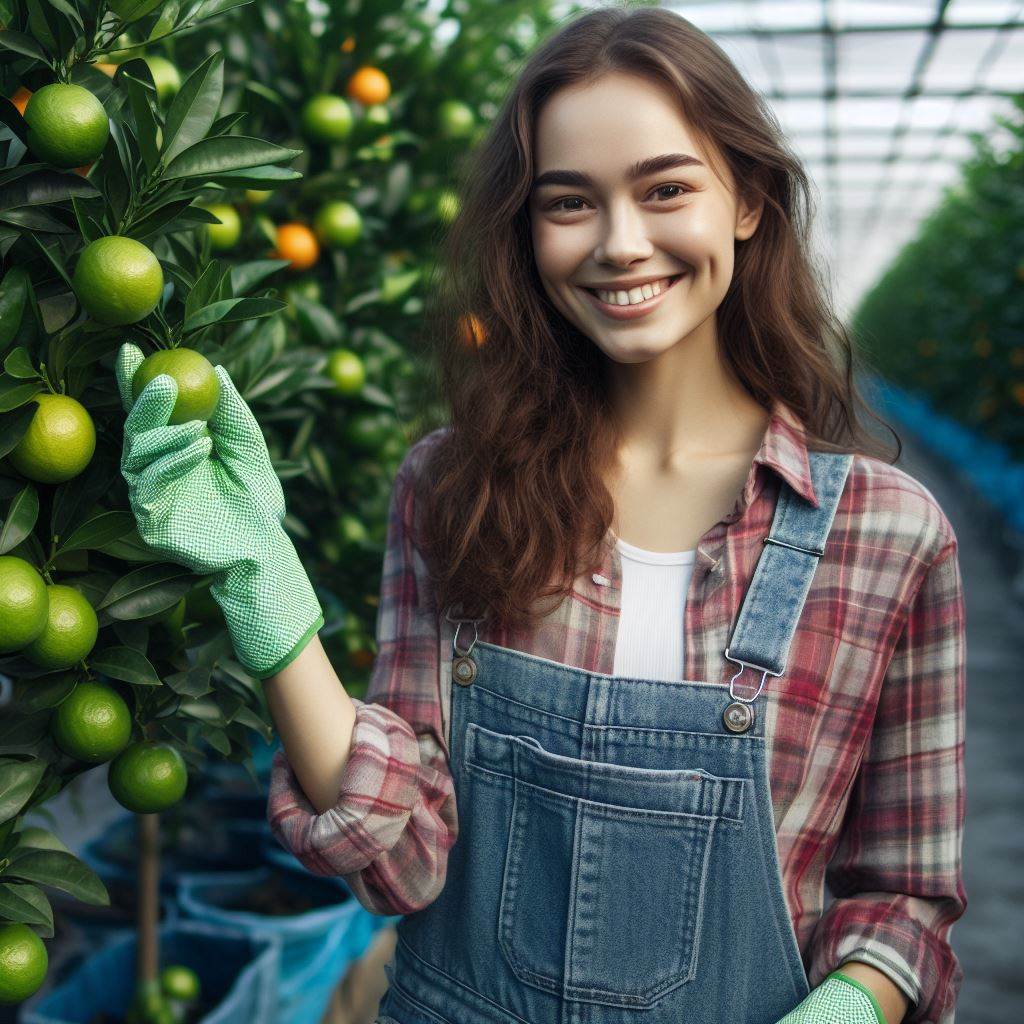Introduction
Organic farming in Texas has become a significant part of the agricultural landscape in recent years.
With an increasing demand for sustainable and healthy food options, organic farmers in Texas have risen to the occasion.
Through the use of natural fertilizers, insect control methods, and soil preservation techniques, these farmers are leading the way in promoting environmentally friendly practices.
The triumphs of organic farming in Texas can be seen in various aspects.
Firstly, organic farmers have successfully preserved the quality of their soil, ensuring long-term productivity.
Through the use of compost and cover crops, they enrich the soil without relying on synthetic chemical fertilizers.
Moreover, organic farming in Texas has shown positive impacts on public health.
Without the use of harmful pesticides and genetically modified organisms, organic produce offers consumers a safer and healthier option.
This has led to an increase in demand for organic products in local markets and stores.
In addition, organic farming has brought economic benefits to Texas.
Local organic farmers have noticed an increase in profits as consumers show a preference for organic food.
This has led to the expansion of organic farming operations, ultimately boosting the local economy.
Overall, organic farming in Texas has proven to be a triumph, benefiting the environment, public health, and the economy.
Through sustainable practices, organic farmers in Texas have set an example for the rest of the nation.
So, join us as we explore the fascinating success stories of organic farming in Texas.
The Rise of Organic Farming in Texas
Statistics on the growth of organic farms in the state
According to recent statistics, organic farming has seen a remarkable rise in Texas over the past decade.
In 2010, the state had only 200 certified organic farms. However, by 2020, the number had more than tripled to reach 650 farms.
This significant growth in organic farming is not limited to small-scale operations.
The statistics show that both large and small farms are embracing organic practices.
In fact, about 45% of the certified organic farms in Texas have more than 100 acres of land, indicating a strong presence of organic agriculture in the state.
Factors contributing to the popularity of organic farming
1. Health and Environmental Concerns
One of the key factors driving the popularity of organic farming in Texas is the growing awareness of health and environmental concerns.
Consumers are becoming increasingly conscious of the negative effects of conventional farming practices, such as the use of synthetic pesticides and genetically modified organisms (GMOs).
As a result, they are turning to organic produce, which is grown without these harmful substances.
Moreover, organic farming promotes soil health, biodiversity, and water conservation.
By eliminating the use of synthetic chemicals, organic farmers help protect the environment and preserve the delicate ecosystem.
This resonates with Texans who value the state’s natural resources and wish to support sustainable practices.
2. Economic Viability
Organic farming is not only environmentally friendly, but it is also economically viable.
Farmers who switch to organic methods can often fetch higher prices for their produce.
The demand for organic products is on the rise, and consumers are willing to pay a premium for food that is free from harmful chemicals.
Additionally, organic farms tend to have lower input costs in the long run.
By focusing on natural soil fertility, crop rotation, and integrated pest management, organic farmers minimize their reliance on expensive synthetic inputs.
This makes organic farming a financially attractive option for both small-scale and large-scale farmers in Texas.
3. Government Support and Certification
The increased popularity of organic farming in Texas can also be attributed to government support and certification programs.
State and federal agencies provide resources and technical assistance to farmers interested in transitioning to organic practices.
These programs help farmers navigate the certification process and offer financial incentives for organic production.
Obtaining organic certification distinguishes farmers in the market and builds consumer trust.
It assures customers that the farm has met rigorous standards and adhered to organic principles.
This certification is a significant factor contributing to the growth of organic farms in Texas.
Basically, Texas has witnessed a remarkable rise in organic farming, with the number of certified organic farms more than tripling in the past decade.
This growth can be attributed to factors such as health and environmental concerns, economic viability, and government support.
As more consumers prioritize organic products, and farmers recognize the benefits of sustainable agriculture, the future of organic farming in Texas looks promising.
Read: Urban Farmer Shift to Sustainable Methods
Transform Your Agribusiness
Unlock your farm's potential with expert advice tailored to your needs. Get actionable steps that drive real results.
Get StartedChallenges faced by organic farmers in Texas
Climate and weather conditions
Organic farmers in Texas face the challenge of dealing with unpredictable climate patterns and extreme weather conditions.
They have to find ways to adapt to droughts, floods, and fluctuations in temperature.
These conditions can greatly affect crop production, soil fertility, and overall farm productivity.
To overcome these challenges, organic farmers implement strategies such as water conservation techniques and soil management practices.
Pest and disease management
One of the major challenges for organic farmers in Texas is the management of pests and diseases without the use of synthetic chemicals.
Organic farmers resort to natural methods like companion planting, biological control, and crop rotation to reduce pest infestations.
They also focus on creating a healthy and biodiverse ecosystem that can help control pests naturally.
However, these methods often require more time, effort, and meticulous planning than conventional methods.
Competition with conventional agriculture
Organic farmers in Texas face competition from conventional agriculture, which often relies on synthetic fertilizers and pesticides.
Conventional farms have larger-scale operations and can produce crops at lower costs.
This puts organic farmers in a disadvantageous position, as they struggle to compete in terms of price and volume.
The organic market is still relatively niche, and consumers often choose conventional products due to their accessibility and affordability.
Despite these challenges, organic farmers in Texas remain resilient and determined.
They understand the importance of sustainable and healthy farming practices.
With increasing awareness about the benefits of organic produce, the demand for organic products is gradually growing.
Consumers are becoming more conscious about their food choices, considering factors like health, environmental impact, and support for local farmers.
This provides hope and motivation for organic farmers to continue their mission.
To address the challenges faced by organic farmers in Texas, various organizations and government initiatives have been established.
These support systems provide training, resources, and technical assistance to organic farmers.
For instance, the Texas Organic Farmers and Gardeners Association (TOFGA) provides educational events, networking opportunities, and advocacy for organic farming.
The Texas Department of Agriculture also offers programs like the Organic Cost Share Program, which helps organic farmers offset the costs of organic certification.
In general, organic farmers in Texas face several challenges such as climate and weather conditions, pest and disease management, and competition with conventional agriculture.
However, their determination to promote sustainable and healthy farming practices keeps them going.
With the growing demand for organic products and the support of various organizations, organic farming continues to triumph in Texas.
Read: Midwest Family Eco Farming Journey: A Midwest Family’s Tale
Success Stories of Organic Farmers in Texas
Profiles of Successful Organic Farming Operations
- Johnson Farms: A family-owned organic farm in Texas that has been successful for over three generations.
- Green Acres Organics: A small-scale organic farm that specializes in rare and heirloom varieties of vegetables.
- Lone Star Ranch: A large organic ranch that focuses on raising grass-fed beef and free-range chickens.
- Harvest Moon Organic Farm: A diversified organic farm that produces a wide range of fruits, vegetables, and herbs.
Their Innovative Techniques and Strategies
- Johnson Farms uses crop rotation, cover cropping, and integrated pest management to maintain soil health and prevent diseases.
- Green Acres Organics implements vertical gardening and hydroponics to maximize space and increase crop yield.
- Lone Star Ranch practices holistic management, ensuring proper animal welfare and sustainable grazing techniques.
- Harvest Moon Organic Farm employs companion planting and natural pest control methods for pest management.
Impact on the Local Community and Environment
- Organic farms contribute to the local economy by providing employment opportunities and supporting local businesses.
- By using organic farming practices, these farms reduce chemical pollution and protect water sources from contamination.
- Organic farms help preserve biodiversity by promoting native species and protecting natural habitats.
- These farms also serve as educational resources, offering workshops and farm visits to educate the community about sustainable agriculture.
In essence, organic farming has thrived in Texas, thanks to the success stories of various farmers.
Farms like Johnson Farms, Green Acres Organics, Lone Star Ranch, and Harvest Moon Organic Farm have demonstrated the viability and effectiveness of organic farming in the region.
These successful operations have implemented innovative techniques and strategies to enhance their yields and maintain the health of their farms.
From Johnson Farms’ crop rotation and integrated pest management to Green Acres Organics’ vertical gardening and hydroponics, each farm showcases unique approaches to sustainable agriculture.
The impact of these organic farms extends beyond their own fields.
They contribute to the local community by providing jobs, supporting local businesses, and fostering a greater sense of food security.
Moreover, their commitment to organic practices minimizes chemical pollution and protects the environment, preserving the region’s natural resources.
Furthermore, organic farmers in Texas play a crucial role in preserving biodiversity.
By promoting native species and protecting natural habitats, they contribute to the overall ecological health of the region.
These success stories inspire others to take up organic farming, promoting sustainable agriculture as a viable and prosperous option.
With their educational initiatives and community involvement, these farms empower individuals and create a ripple effect of positive change.
Overall, the triumph of organic farming in Texas showcases the potential for sustainable agriculture to thrive in diverse regions.
Through the profiles of successful farms, innovative techniques, and their impact on the local community and environment, it is evident that organic farming holds great promise for Texas and beyond.
Read: Grains of Grit: Women’s Resilience in Farming

Benefits of organic farming in Texas
Organic farming is gaining momentum in Texas and for good reason.
It offers numerous benefits that positively impact our health, environment, and overall ecosystem.
Let’s dive into the different advantages of organic farming in Texas:
Health benefits of consuming organic produce
- Organic farming eliminates the use of synthetic pesticides, herbicides, and fertilizers.
- This reduces our exposure to harmful chemicals, which can have long-term health effects.
- Organic produce is higher in essential nutrients, such as vitamins, minerals, and antioxidants.
- Studies have shown that organic fruits and vegetables have lower levels of pesticide residues.
- Consuming organic food lowers the risk of developing certain diseases, including cancer, obesity, and heart disease.
Preservation of soil fertility and water resources
- Organic farming techniques prioritize soil health and fertility through practices like crop rotation and composting.
- These practices help maintain the natural balance of nutrients in the soil and promote long-term sustainability.
- Organic farming reduces soil erosion, as it avoids the use of chemical-intensive practices that can degrade soil quality.
- By avoiding synthetic pesticides and fertilizers, organic farming also helps protect water resources from contamination.
- Chemicals used in conventional agriculture contribute to water pollution, affecting both human and aquatic life.
Support for biodiversity and ecosystem balance
- Organic farms prioritize biodiversity by providing habitat for a diverse range of plants, animals, and insects.
- These diverse ecosystems are important for pollination, natural pest control, and overall ecosystem balance.
- Organic farms promote the use of natural predators and beneficial insects to control pests, reducing the need for chemical insecticides.
- Preserving biodiversity also helps maintain genetic diversity in crops, making them more resilient to diseases and climate change.
- Organic farming contributes to the conservation of native plant species, which are essential for the survival of local wildlife.
In a nutshell, organic farming in Texas offers a multitude of benefits.
By consuming organic produce, we can reduce our exposure to harmful chemicals and improve our overall health.
Additionally, organic farming practices help preserve soil fertility, protect water resources, and support biodiversity.
Embracing organic agriculture is not just a trend, but a step towards a more sustainable and healthier future for Texas and beyond.
Read: She Grows: The Rise of Female Farm Entrepreneurs
Government support and policies for organic farming in Texas
Initiatives and programs promoting organic agriculture
- The government of Texas has implemented various initiatives to promote organic agriculture.
- One such program is the Organic Certification Cost Share Program, which helps farmers cover the cost of organic certification.
- This program assists small and mid-sized organic farmers in meeting the requirements of organic certification.
- The Texas Department of Agriculture offers educational resources and outreach programs to promote organic farming.
- These initiatives aim to increase awareness and knowledge about organic farming practices among farmers.
- The government conducts workshops, training sessions, and seminars to educate farmers about sustainable agriculture.
- These programs provide valuable information on organic crop production, pest management, and soil health.
- The government also supports research and development in organic farming through grants and funding opportunities.
- These funds enable farmers to explore innovative organic farming techniques and improve overall productivity.
Available resources and assistance for organic farmers
- Organic farmers in Texas have access to various resources and assistance provided by the government.
- The Texas Department of Agriculture provides information on organic farming regulations and certification requirements.
- They offer technical guidance and support to help farmers navigate the organic certification process.
- Farmers can receive assistance in developing organic farming plans, implementing sustainable practices, and managing pests organically.
- The government also offers financial support through grants and loans specifically targeted at organic farmers.
- These funds can be used for purchasing organic inputs, establishing infrastructure, and expanding organic operations.
- Additionally, organic farmers can access market development resources to promote their products.
- The government assists farmers in identifying potential markets, promoting organic products, and connecting with buyers.
- The Texas Farmers Markets program helps organic farmers gain visibility and sell their products directly to consumers.
- This program supports the establishment and operation of farmers markets where organic farmers can showcase and sell their produce.
- Organic farmers can also benefit from the Texas Organic Agricultural Industry Advisory Board.
- The board provides advice and recommendations to the government on policies and programs related to organic farming.
- They represent the interests of organic farmers and help shape regulations and policies that support the organic agriculture sector.
Therefore, the government of Texas recognizes the importance of organic farming and actively supports the development of this industry.
Through various initiatives, programs, and resources, they promote organic agriculture and assist farmers in adopting sustainable farming practices.
The government’s efforts not only benefit individual farmers but also contribute to the overall growth and success of organic farming in Texas.
Conclusion
Recap of the Triumphs and Benefits of Organic Farming in Texas
Organic farming in Texas has flourished, yielding abundant rewards for both farmers and consumers.
By eschewing synthetic pesticides and fertilizers, organic farmers have nurtured soil health, safeguarded water resources, and preserved biodiversity.
Their dedication to sustainable practices has revitalized ecosystems and enriched local communities.
Through meticulous attention to crop rotation and natural pest control, organic farmers have cultivated resilient agricultural systems resistant to climate fluctuations.
In addition to promoting environmental stewardship, organic farming fosters human health by delivering nutritious, chemical-free produce.
Embracing organic agriculture embodies a commitment to the well-being of present and future generations.
Encouragement for Readers to Support Organic Farmers
As consumers, we possess the power to shape the agricultural landscape through our purchasing choices.
By prioritizing organic products, we champion farmers who prioritize ecological harmony and human health.
Supporting organic agriculture not only promotes sustainable land management but also empowers local economies.
By investing in organic farms, we invest in a future where food is cultivated in harmony with nature, free from harmful chemicals.
Let us stand in solidarity with organic farmers, recognizing their pivotal role in fostering a healthier, more sustainable world.
Together, we can cultivate a brighter future for Texas and beyond.
Generally, the triumphs of organic farming in Texas are manifold, ranging from environmental conservation to public health promotion.
Organic farmers exemplify resilience, innovation, and a deep-seated commitment to the land.
As stewards of the Earth, they inspire us to reimagine our relationship with food and nature.
Let us honor their efforts by advocating for policies that support organic agriculture and by consciously choosing organic products.
In doing so, we not only safeguard the planet for future generations but also nurture our own well-being.
The success of organic farming in Texas serves as a beacon of hope, illuminating a path towards a more sustainable and harmonious future.
In closing, I urge you to join the organic movement, to stand with Texas farmers in their pursuit of a healthier, greener tomorrow.
Together, let us sow the seeds of change and reap the bountiful harvest of sustainability. The journey towards a more organic
Texas begins with each of us, making mindful choices every day.
Let us embrace the transformative power of organic farming and cultivate a legacy of abundance, vitality, and harmony for generations to come.




